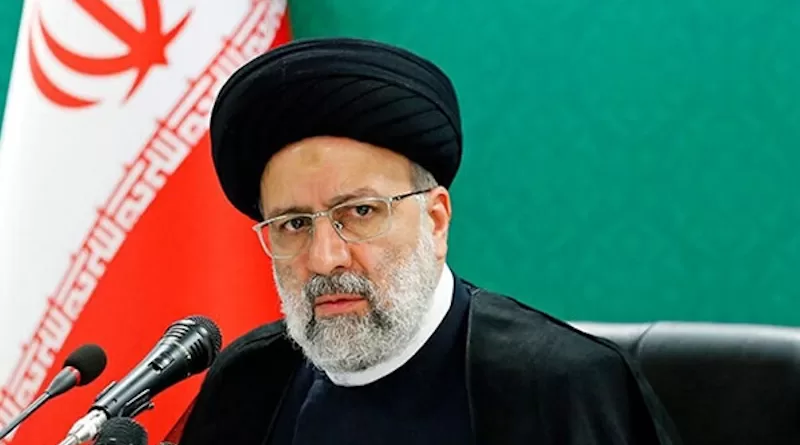Anti-Americanism (Americophobia) – OpEd
By Hamid Enayat
In his anti-American speech at the annual UN General Assembly meeting on August 23, 2021, Ebrahim Raisi said: “What we see in the region today is that not only hegemony and hegemonic thinking but also the project of imposing Western identity has failed. The mistake of the US in the past several decades has been that instead of changing its ‘way of life’ with the world, it changes his ‘way of war’ with the world.” He further called for the lifting of all sanctions.
In a letter to the current president of Iran, one of the writers close to the regime writes that for many years, the whole wealth of the country has been poured into the wells of nuclear so that the Iranian regime in the face of the West can take advantage of them. The question is why the confrontation with Europe and the United States so necessary that the country’s wealth should be spent on nuclear weapons.
The anti-American policy is a strategic policy of the Islamic Republic. Given the continuation of the anti-American policy, there will naturally be no compromise with the United States. And this “strategic loneliness of Iran”, that is, facing the whole world, has created many bottlenecks and calamities for Iran. In escalation with the international order, the opportunities for Iran’s development and progress are lost one by one. For 43 years, the anti-Americanism and anti-Westernism have harmed our national interests and our economy, while more than 80 percent of Iranians are poor and millions of educated Iranians are unemployed.
The consequences of “Iran’s strategic loneliness” is that Iran, unlike many other countries, naturally has no reliable foreign ally based on history, geography, language or religion. Therefore, alliances with world powers such as Russia and China are inherently artificial, rootless, and consequently unstable and unreliable.
Why arrogance?
The sub-capitalist regime imposed on the modern world following a historic event is forced to expand in order to survive, manifested in the form of terrorism or interventionist policies in the region, thus colliding with American interests. Under the slogan of “Death to America”, it forms the most backward strata in the region to form militias. An Iranian intelligence official once said that the Ministry of Intelligence did not do as much as the slogan of “Death to America” worked for us and had results.
Economic sanctions
In line with its arrogance, the Islamic Republic will face sanctions from the international community for its terrorism and political influence in the region, or for acquiring a nuclear weapon (for its own survival and expansion in the region).
Sanctions on Iranian banks and financial and commercial institutions such as the metal, petrochemical, shipping and airline industries on charges of “supporting terrorism” and “proliferation of weapons of mass destruction” and even “human rights violations” are making the JCPOA knot tighter every day. Because sanctions with labels unrelated to Iran’s nuclear program make things more difficult.
After the explosion at the Natanz facility, it became clear that Israel, with the tacit agreement of the United States, would not allow Iran to acquire a nuclear weapon. The assassination of Dr. Fakhrizadeh, Iran’s nuclear father, was a fatal blow to Iran’s nuclear program, and the subsequent explosion or sabotage at the Natanz facility caused Iran to halt access to its nuclear program for an unknown period.
Difficult diplomacy
Iran, however, sought to strengthen its components in the missile program and regional policies. It tried to interact with the International Atomic Energy Agency with the aim of maintaining the JCPOA, and decided to increase pressure on the West in the nuclear program.
Security against sanctions
Khamenei had said in an internal meeting after making sure that the United States would not go to war that the only lever we could have against the United States was security. That is, endangering US interests in the region. To force the United States to lift sanctions and to continue to expand in the region.
Attacks on multinational civilian ships near the UAE, attacks on Aramco pumping stations, attacks on Saudi Arabia by Houthis and drones, missile strikes on Saudi Arabia, and even attacks on Japanese ship just as the Japanese prime minister was carrying a message from the US President are all part of the same strategy of Iran: security against sanctions.
But after Soleimani’s elimination on January 3, 2020, the regime halted military operations that could have killed Americans for fear of retaliatory military strikes, and even informed the United States of its retaliatory action in Ein-ul-Yaghin. The United States suffered no casualties, although it did not stop harassing attacks.
The Iranian Supreme Leader, who is facing a very deep crisis of legitimacy in Iran and has gone through two uprisings in January 2017 and mid-November 2019, is facing the danger of another uprising that seems certain, and so this time wants to try to take advantage of the United States and Europe in this regard with a nuclear bomb and hollow threats, and to lift all sanctions, even those stemming from terrorism and human rights. In this way, it may be able to prevent this uprising with an opening that may occur in a collapsed economy.

